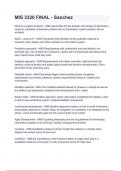Exam (elaborations)
MIS 3320 FINAL - Sanchez Questions with 100% Actual correct answers | verified | latest update | Graded A+ | Already Passed | Complete Solution
- Course
- Institution
MIS 3320 FINAL - Sanchez Questions with 100% Actual correct answers | verified | latest update | Graded A+ | Already Passed | Complete Solution
[Show more]



